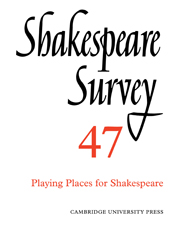Book contents
- Frontmatter
- Shakespeare Played Small: Three Speculations about the Body
- The Architecture of the Fortune Playhouse
- The Bare Island
- ‘How Chances it they Travel?’ Provincial Touring, Playing Places, and the King’s Men
- Writing for the Metropolis: Illegitimate Performances of Shakespeare in Early Nineteenth-Century London
- The Perishable Body of the Unpoetic: A. C. Bradley Performs Othello
- Playing Places for Shakespeare: The Maddermarket Theatre, Norwich
- ‘A Fairly Average Sort of Place’: Shakespeare in Northampton, 1927–1987
- The Living Monument: Self and Stage in the Criticism and Scholarship of M. C. Bradbrook
- Stratford Stages: Interviews with Michael Reardon and Tim Furby, and Sam Mendes
- Dis-Covering the Female Body: Erotic Exploration in Elizabethan Poetry
- Theseus’ Shadows in A Midsummer Night’s Dream
- ‘Time for Such a Word’: Verbal Echoing in Macbeth
- Shakespeare’s Knowledge of Italian
- Tamburline and Edward Alleyn’s Ring
- Shakespeare Performances in England, 1992–1993
- Professional Shakespeare Productions in the British Isles, January-December 1992
- The Year's Contributions to Shakespeare Studies 1 Critical Studies
- 2 Shakespeare’s Life, Times, and Stage
- 3 Editions and Textual Studies
- Books Received
- Index
Shakespeare Played Small: Three Speculations about the Body
Published online by Cambridge University Press: 28 March 2007
- Frontmatter
- Shakespeare Played Small: Three Speculations about the Body
- The Architecture of the Fortune Playhouse
- The Bare Island
- ‘How Chances it they Travel?’ Provincial Touring, Playing Places, and the King’s Men
- Writing for the Metropolis: Illegitimate Performances of Shakespeare in Early Nineteenth-Century London
- The Perishable Body of the Unpoetic: A. C. Bradley Performs Othello
- Playing Places for Shakespeare: The Maddermarket Theatre, Norwich
- ‘A Fairly Average Sort of Place’: Shakespeare in Northampton, 1927–1987
- The Living Monument: Self and Stage in the Criticism and Scholarship of M. C. Bradbrook
- Stratford Stages: Interviews with Michael Reardon and Tim Furby, and Sam Mendes
- Dis-Covering the Female Body: Erotic Exploration in Elizabethan Poetry
- Theseus’ Shadows in A Midsummer Night’s Dream
- ‘Time for Such a Word’: Verbal Echoing in Macbeth
- Shakespeare’s Knowledge of Italian
- Tamburline and Edward Alleyn’s Ring
- Shakespeare Performances in England, 1992–1993
- Professional Shakespeare Productions in the British Isles, January-December 1992
- The Year's Contributions to Shakespeare Studies 1 Critical Studies
- 2 Shakespeare’s Life, Times, and Stage
- 3 Editions and Textual Studies
- Books Received
- Index
Summary
Any space we occupy deeply affects how we perceive events inside it. We are bodies which occupy space and, metaphorically speaking, are occupied by it; especially when we are present in a space marked off from the mundane, like a holy temple or a chamber for the exercise of power, we are likely to alter not only our behaviour but our frame of mental reference. Theatres, which are spaces separate from ordinary life by definition, affect us not only by their architecture and decor but also by the spatial relationship established between actor and spectator. From the hillside amphitheatres of Athens in the fifth century BC to the concrete cinema bunkers of late twentieth-century suburban shopping malls, a theatre space is inscribed with ideas about the position of drama within the culture that built it.
For Shakespeare the issue of space has assumed particular importance, and in the modern era has been highly contested, partly because the status of Shakespeare's plays has focused attention on where they can be seen to best advantage. While most of us imagine Burbage's the Theatre or the Globe when we think of the original productions, the plays were performed in their own time in a variety of public, private and royal spaces, a fact that should make us question the common notion that they were 'written for' the public theatre or were somehow contained by it.
- Type
- Chapter
- Information
- Shakespeare Survey , pp. 1 - 14Publisher: Cambridge University PressPrint publication year: 1994



